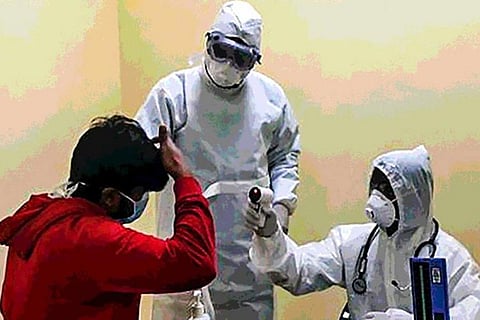

Kerala heaved a sigh of relief after it was found that three coronavirus patients, who could have been potential super spreaders, did not pass on the infection to even a single person. All three of them had a long list of primary contacts.
On Easter Sunday, a fully recovered patient walked out of Kasaragod district’s General Hospital after spending 24 days in isolation. The Eriyal native had received much flak as he had attended several functions, despite returning from the Gulf. But days after he was isolated on March 19, all of Ameer’s 40 odd primary contacts tested negative for the virus. This included his mother and son, who lived with him and ‘whom he had hugged and kissed’, as per the patient’s own admission. Other than the 40 primary contacts, the Kasaragod administration had asked scores of people who were at weddings and other events he had taken part in, to be quarantined. But no one was infected.
In Palakkad, a 51-year-old man from Karakurissi grabbed headlines after he exposed over 150 people to the risk of contracting the coronavirus by violating home quarantine. The Dubai-returnee had carelessly visited the local mosque multiple times and had even attended a private party of 15 guests. However, after being isolated on March 25, all of his 15 primary contacts – including his immediate family of 14 – tested negative for the virus, Palakkad DMO KP Reetha confirmed to TNM.
A similar incident was reported in Thiruvananthapuram too, when an Italian tourist who spent 15 days in Varkala before testing positive on March 14 ended up not passing the infection to a single person from his list of contacts. The patient had met with 103 persons in the seaside town, out of which 50 people – including staff at the resort where he stayed – were categorised as high-risk.
“Although Varkala had been placed on alert, we did not detect any more cases from the town and all of the patient’s contacts tested negative. This was a relief,” Thiruvananthapuram DMO Dr P Preetha told TNM.
Is this reason enough to be relieved?
Kasaragod District Medical Officer AP Ramdas says that infectivity depends on several factors. However, just because a few patients did not spread the virus does not mean social distancing measures can be relaxed.
“Infectivity can depend on the viral load of the patient – which reveals how well a virus is replicating inside a person with the infection. It can also depend on individual immunity. Sometimes, primary contacts who have good immunity may not get the virus. Some of them may carry the virus but remain asymptomatic. So, we cannot come to any conclusion based on this,” Ramdas said.
Further, Idukki District Medical Officer TR Rekha added that in many cases, only high-risk primary contacts are screened for the virus, even while there may be several asymptomatic carriers.
“Among primary contacts being observed, we test those people who exhibit symptoms of COVID-19. From research being done in other countries, we hear that 80% of people who get the virus and recover show no symptoms. Though there is no conclusive proof of this statistic, the fact remains that it is difficult to test everybody,” she added.
Rekha cited the example of the Idukki-based politician who was COVID-19 positive, to explain that one cannot establish a pattern from observing a few patients who did not pass the infection to others.
“While the Idukki patient himself had only passed the infection to two primary contacts out of the scores of people he had come in contact with during his travels, the two contacts who contracted the virus from him ended up infecting four of their family members in total. So it depends on multiple factors really,” she added.